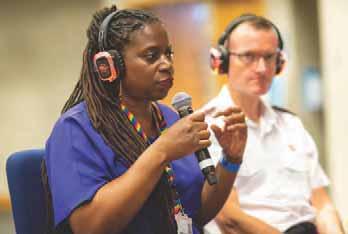
3 minute read
Feature
Marking the centenary of the Anglo-Irish Treaty, George Tanton sheds light on one officer’s experiences of the Irish Civil War and The Salvation Army’s neutrality
BALLYMACARRETT I (BELFAST) BAND 1923
TUESDAY 6 December marks 100 years since the creation of the Irish Free State, a dominion established out of the Anglo-Irish Treaty that ended the Irish War of Independence (1919–1921).
Dissatisfied with the technicalities of the treaty, which ensured that the Irish Free State be made a self-governing protectorate but still within the British Empire, the anti-treaty faction of the IRA continued fighting against the British and pro-treaty forces of the provisional government in what was the Irish Civil War (1922–1923). Committed to being a non-partisan presence in Ireland, Salvationists continued to serve others without political discrimination on both sides of the conflict, as they had done during the 1916 Easter Rising.
In January 1923, Irish Salvationist Colonel James J Cooke published an article in the War Cry, titled ‘Ireland revisited: Salvation fighting under difficulties’, in which he observed the dangerous circumstances across Belfast, Derry and Dublin – and how Salvationists remained steadfast in serving others with Christian love and compassion. He wrote:
‘It came as a shock to me on my arrival in Londonderry, to see what looked like the familiar blockhouses – “pill-boxes” – of devastated Belgium and France. There had been terrible fighting in Derry and several people shot, but our people “carried on” their good work…
‘Belfast earlier in the year was not a health resort! Our three corps near the Northern Station experienced much sniping – many were shot on both sides, and a great many public houses were burnt. People lived in terror, yet Salvationists were respected alike by loyalists and rebels.’
Colonel Cooke praised the Salvation Army officers and soldiers serving on both sides of the divide: ‘Our dear Salvationists have been very brave – staff officers, field officers and social officers alike – in the north, in Dublin, and in Cork. The soldiers were magnificent in resisting their natural instincts to take part politically.’
‘Oh! The wisdom of our Founder,’ he passionately exclaimed, ‘who said, “Let your politics be Jesus Christ and his Kingdom.”’
The colonel recounted one situation that happened before an open-air meeting in Belfast. The wife of a Salvation Army officer had bravely approached some armed men of the antitreaty faction and asked for a temporary ceasefire in order for the service to take place. Cooke explained that the leader of the men replied: ‘Carry on, Miss, we’ll let you know when the signal to begin shooting comes.’
Encouraged by the respect and trust shown by the opposing pro-treaty and anti-treaty forces towards The Salvation Army, the colonel testified that, during the conflict, many combatants were ministered to by The Salvation Army’s officers: ‘Just as the British “Tommies” listen in garrison towns, so do Free State soldiers listen, and if anything with far more interest. To many of the latter the testimonies are new. We have a greater opportunity than ever before in Dublin and Kingstown. Let Salvationists everywhere pray that God will baptise our present comrades and raise up many more.’
Today across the United Kingdom and Ireland Territory, Salvationists still serve others without discrimination, including people experiencing homelessness, people struggling with addiction, and refugees displaced from their home countries.
At the beginning of Advent, a time when all Christians begin to celebrate the birth of Christ, the Prince of Peace, Salvationists can take inspiration from Colonel Cooke’s conviction: ‘My faith is strong in the Lord of Hosts, who will over-rule all things for good.’
GEORGE TANTON
Editorial Assistant Salvationist










